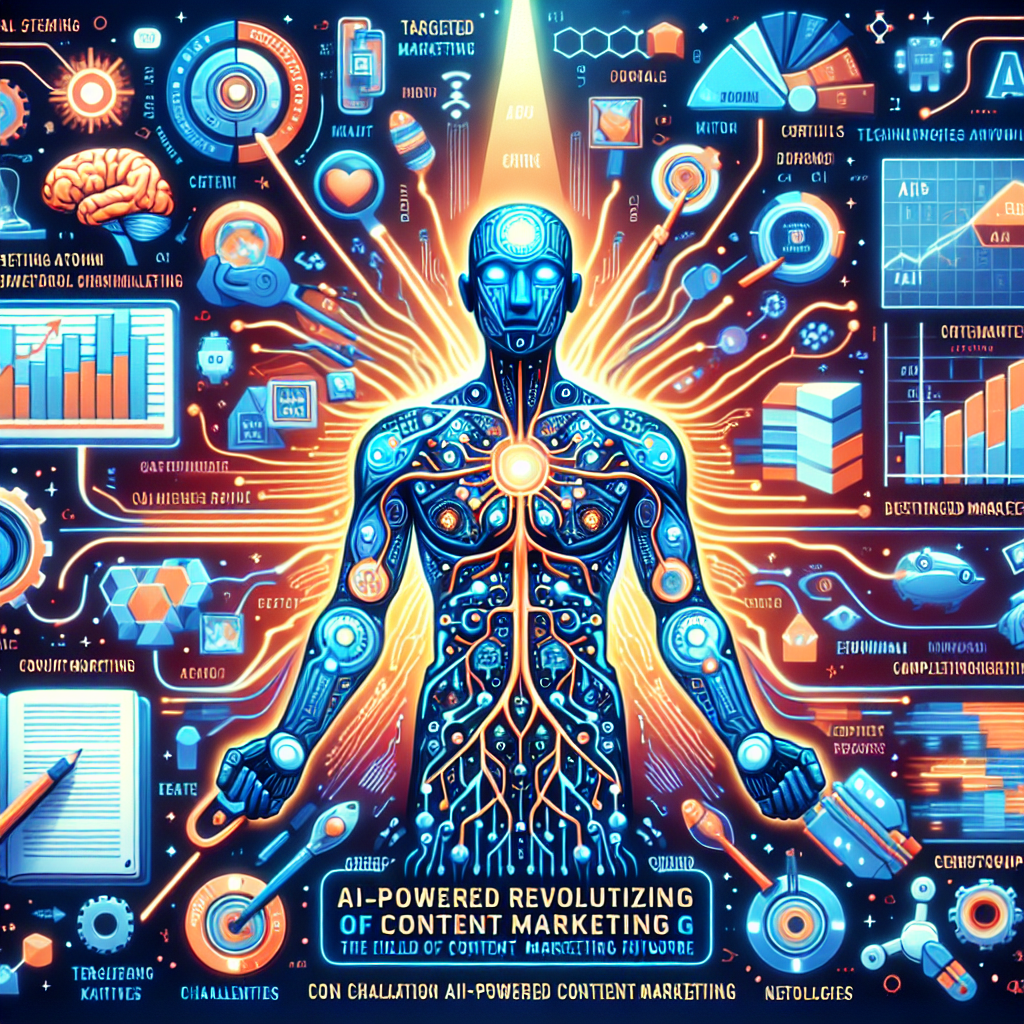Imagine a world where content creation is seamless and efficient, where marketers can effortlessly connect with their target audience, and where customer engagement is at an all-time high. This is the future that awaits us in the world of content marketing, and it is being shaped by the incredible power of artificial intelligence (AI). In this article, we will explore the ways in which AI is revolutionizing the field of content marketing and how businesses can leverage this technology for unparalleled success.

The Growth of Content Marketing
Content marketing has experienced significant growth in recent years, becoming an integral part of marketing strategies for businesses across various industries. But what exactly is content marketing? Simply put, it is the practice of creating and distributing valuable, relevant, and consistent content to attract and engage a target audience.
Definition of content marketing
Content marketing is a strategic approach that focuses on creating and delivering valuable content to attract and retain a clearly-defined audience. This content can come in various forms, such as blog posts, articles, videos, infographics, and social media posts. The goal is to provide relevant information, educate the audience, and establish trust and credibility.
Importance of content marketing
Content marketing plays a crucial role in establishing a brand’s online presence and building a relationship with its target audience. By providing valuable and relevant content, businesses can showcase their expertise and establish themselves as industry leaders. This, in turn, helps to build trust and loyalty among consumers.
Content marketing also helps businesses to attract and retain customers. By consistently offering valuable content, brands can keep their audience engaged and informed, ultimately leading to increased brand awareness, customer loyalty, and conversion rates.
Furthermore, content marketing has proven to be cost-effective compared to traditional marketing methods. Instead of relying solely on paid advertisements, businesses can leverage content marketing to organically attract and engage their target audience, resulting in a higher return on investment.
Current trends in content marketing
Content marketing continues to evolve with the advancements in technology and consumer preferences. Some prominent trends in content marketing include:
-
Video content: Video has become a dominant form of content, with platforms like YouTube and TikTok gaining immense popularity. Marketers are leveraging video content to engage their audience and convey their messages effectively.
-
User-generated content: Encouraging users to create and share content related to a brand has become a popular way to generate authentic and engaging content. User-generated content not only helps to build trust but also expands the reach of a brand.
-
Interactive content: Interactive content, such as quizzes, polls, and interactive infographics, encourages active participation from the audience, enhancing engagement and making the content more memorable.
-
Voice search optimization: With the rise of voice assistants like Siri and Alexa, optimizing content for voice search has become essential. Creating content that answers common voice search queries can help businesses attract more organic traffic.
-
Personalization: Consumers today expect personalized experiences. Content marketers are using data and AI-powered tools to personalize content and tailor it to the specific interests and preferences of their audience.
Introduction to Artificial Intelligence (AI)
Artificial Intelligence, often referred to as AI, is a rapidly growing field that focuses on creating intelligent machines capable of performing tasks that typically require human intelligence. AI encompasses various technologies, such as machine learning, natural language processing, and computer vision, that enable machines to learn, reason, and make decisions.
Definition of AI
AI refers to the simulation of human intelligence in machines that are programmed to learn from their experiences, interpret data, and take actions based on that information. It involves the development of algorithms and systems that can perform tasks like speech recognition, problem-solving, and decision-making.
Applications of AI
AI has found applications in numerous fields, including healthcare, finance, transportation, and entertainment. In healthcare, AI is being used to develop diagnostic tools, analyze medical images, and assist in drug discovery. In finance, AI-powered algorithms are used for fraud detection, risk assessment, and algorithmic trading. The transportation industry is exploring AI for the development of autonomous vehicles and optimizing routes. AI has also made its way into the entertainment industry through applications like recommendation systems and virtual assistants.
AI in marketing
AI has also made a significant impact on the field of marketing. By harnessing the power of AI, marketers are able to analyze large amounts of data, automate processes, and make data-driven decisions. AI-powered tools and technologies have revolutionized various aspects of marketing, including content creation, personalization, distribution, and analytics.
The Role of AI in Content Marketing
AI has become a valuable tool for content marketers, empowering them to enhance their strategies, streamline processes, and deliver more personalized and relevant content to their audience. Let’s explore some key areas where AI is playing a significant role in content marketing.
Automated content creation
AI-powered content generation tools have been developed to assist content creators in generating high-quality content efficiently. These tools use natural language processing and machine learning algorithms to analyze existing content and create new pieces based on the identified patterns and preferences of the target audience. This helps content marketers save time and effort while maintaining consistent content production.
Improving content personalization
One of the key goals of content marketing is to deliver personalized experiences to the audience. AI enables content marketers to understand audience preferences and behavior by analyzing data collected from various sources. This data can then be used to tailor content recommendations, ensuring that each audience member receives content that is relevant to their interests, needs, and stage in the customer journey.
Enhancing content distribution
AI-driven content promotion strategies have become increasingly popular in content marketing. These strategies involve leveraging AI algorithms to identify the most effective channels for content distribution, target the right audience segments, and personalize the content delivery. AI also enables automated social media management, making it easier for content marketers to schedule and publish posts, engage with followers, and analyze the performance of their social media campaigns.
Optimizing content analytics
In the age of big data, analyzing and interpreting the vast amounts of data generated by content marketing efforts can be challenging. AI-powered data analytics tools make this process more manageable, enabling content marketers to gain valuable insights into the performance of their content. By leveraging AI algorithms, content marketers can identify key performance metrics, track audience engagement, and make data-driven decisions to optimize their content strategies.
Automated Content Creation
The demand for high-quality content is ever-increasing, and content creators often find themselves facing tight deadlines and resource constraints. AI-powered content generation tools have emerged as a solution to this challenge, offering a range of benefits and possibilities.
AI-powered content generation tools
AI-powered content generation tools use natural language processing and machine learning algorithms to analyze vast amounts of data and create unique content pieces. These tools can generate blog posts, articles, product descriptions, and even social media captions. By analyzing the preferences and patterns in existing content, these tools can produce new pieces that are highly relevant and tailored to a specific target audience.
Benefits of automated content creation
Automated content creation offers several benefits for content marketers. Firstly, it saves time and effort by automating repetitive tasks, allowing content creators to focus on higher-level activities, such as strategy development and creative brainstorming. Secondly, these tools can generate content at a much faster pace, enabling businesses to maintain a consistent content production schedule. Lastly, automated content creation helps to ensure consistency and accuracy in messaging, as AI algorithms can analyze brand guidelines and incorporate them into the generated content.
Challenges and limitations of AI-generated content
While AI-generated content holds significant potential, it is not without its challenges and limitations. Although AI algorithms are becoming increasingly sophisticated, they can still struggle with nuances of language, context, and creativity. This can result in content that lacks human touch and fails to resonate with the audience on an emotional level. Additionally, there are ethical considerations regarding the source and use of data when creating AI-generated content. Content marketers must carefully consider these challenges and strike a balance between automated content creation and human creativity.

Improving Content Personalization
Content personalization has become a key priority for marketers, as personalized experiences have been proven to drive engagement, loyalty, and conversions. With the help of AI, content marketers can take personalization to new heights and tailor their content offerings to the specific preferences and needs of their audience.
Understanding audience preferences
AI-powered data analytics tools enable content marketers to gather and analyze vast amounts of data on their target audience. By leveraging this data, marketers can gain valuable insights into audience preferences, interests, and behavior. These insights can be used to create detailed audience profiles, understand the content formats and topics that resonate with them, and develop content strategies that align with their needs.
Tailoring content recommendations
AI algorithms can generate personalized content recommendations based on the analysis of user data. By tracking user behavior, such as the articles they read, the videos they watch, and the products they purchase, AI can identify patterns and make content suggestions that are highly relevant to individual audience members. This level of personalization enhances the user experience and increases the likelihood of audience engagement and conversion.
Dynamic content creation
AI-powered tools can also enable the creation of dynamic content that adapts in real-time based on user interactions. For example, a website could dynamically adjust its content layout, imagery, and messaging based on the user’s preferences, location, or stage in the customer journey. This level of personalization creates a more immersive and tailored experience for the audience, increasing their engagement and likelihood to convert.
Enhancing Content Distribution
Creating high-quality and personalized content is only half the battle. To reach the right audience and maximize the impact of content marketing efforts, effective content distribution strategies are crucial. AI offers valuable insights and tools that can optimize content distribution and increase its reach and impact.
AI-driven content promotion strategies
AI algorithms can analyze vast amounts of data to identify the most effective channels and strategies for content promotion. By analyzing audience demographics, behavior, and preferences, AI can recommend the best platforms, social media networks, and distribution channels to reach the target audience. This enables content marketers to optimize their budget allocation, invest in high-performing channels, and maximize the ROI of their content distribution efforts.
Identifying the right channels
With so many content distribution channels available, it can be overwhelming for content marketers to determine the most suitable ones for their target audience. AI-powered tools can analyze audience data and provide valuable insights on which channels are most likely to reach and engage the target audience effectively. By leveraging these insights, marketers can allocate their resources wisely and focus on the most promising channels for content distribution.
Targeting and reaching the right audience
Content marketing is most effective when it reaches the right audience. AI algorithms can analyze extensive data on audience demographics, behavior, and preferences to identify the specific segments that are most likely to be interested in the content. By using this information, marketers can create targeted campaigns that speak directly to the intended audience, increasing the chances of engagement and conversion.
Automated social media management
Managing multiple social media accounts and platforms can be time-consuming and challenging. AI-powered social media management tools can streamline the process by automating tasks such as posting content, scheduling posts at optimal times, and analyzing the performance of social media campaigns. This automation enables content marketers to save time and effort, while also ensuring consistent and effective social media presence.

Optimizing Content Analytics
Measuring the performance of content marketing efforts is crucial for understanding what works and what doesn’t. AI-powered data analytics tools enhance the measurement and optimization of content marketing strategies by providing valuable insights into audience engagement, content performance, and opportunities for improvement.
AI-powered data analytics
AI algorithms can analyze vast amounts of data in real-time, providing content marketers with valuable insights into audience behavior and content performance. By tracking metrics such as page views, time spent on page, bounce rates, and click-through rates, AI algorithms can identify patterns and trends, helping marketers understand what content resonates most with their audience.
Identifying content performance metrics
With AI-powered data analytics, content marketers can identify key performance indicators (KPIs) that are most relevant to their content marketing goals. For example, if the goal is to increase brand awareness, metrics like social media reach, brand mentions, and website traffic can be analyzed. If the goal is lead generation, metrics such as conversion rates, form submissions, and email sign-ups can be tracked. AI helps marketers determine the most relevant metrics and make data-driven decisions to optimize their content strategies.
Predictive analytics for content marketing
AI algorithms can also leverage historical data to make predictions about future content performance. By analyzing past content engagement data, AI can identify patterns and trends that can be used to predict which types of content will likely perform well in the future. This insight helps marketers allocate resources more effectively and produce content that is more likely to resonate with their audience.
A/B testing with AI
A/B testing is a powerful technique used in content marketing to compare the performance of different variations of content. AI algorithms can automate the A/B testing process, making it easier for marketers to test different headlines, images, and layouts. By analyzing the performance of each variation, AI algorithms can determine which version performs best and help content marketers make data-driven decisions to optimize their content strategies.
Ethical Considerations in AI-Driven Content Marketing
AI-driven content marketing brings about ethical considerations that need to be taken into account to ensure transparency, fairness, and security.
Data privacy and security
AI-powered content marketing relies heavily on data collection and analysis. It is crucial for content marketers to prioritize data privacy and ensure compliance with data protection regulations. Proper measures must be taken to protect the personal information of the audience and to ensure that data is stored securely.
Ensuring transparency and fairness
As AI algorithms continue to generate content and make decisions, it becomes essential to maintain transparency and fairness. Content marketers must clearly communicate when AI is involved in the creation or recommendation of content. Additionally, measures should be taken to ensure that bias, both intentional and unintentional, is minimized or eliminated from the AI algorithms’ decision-making process.
Guarding against AI-generated fake content
The rise of AI has also raised concerns about the potential for AI-generated fake content. Content marketers must be cautious and implement safeguards to prevent AI algorithms from creating or spreading false information. Quality control measures should be in place to verify the accuracy and authenticity of AI-generated content before it is published or distributed.

The Future of AI in Content Marketing
As AI continues to advance at a rapid pace, the future of content marketing looks promising. Let’s examine some emerging AI technologies and their implications for content marketing.
Emerging AI technologies for content marketing
The field of AI is constantly evolving, and new technologies are emerging that have the potential to revolutionize content marketing. Some emerging AI technologies include natural language generation, sentiment analysis, chatbots, and voice assistants. These technologies will enable content marketers to create more dynamic and interactive content, enhance personalized user experiences, and automate customer interactions.
The impact of AI on content creators
The rise of AI has raised concerns about the potential impact on content creators. While AI-powered tools may automate certain aspects of content creation, they cannot replace human creativity, insight, and storytelling capabilities. Instead, AI will augment the capabilities of content creators, enabling them to work more efficiently, analyze data more effectively, and focus on higher-level tasks that require human ingenuity.
Human-AI collaboration in content marketing
The future of content marketing lies in the collaboration between humans and AI. Content marketers will continue to leverage AI-powered tools and technologies to enhance their strategies, automate processes, and deliver personalized content. However, human creativity, intuition, and empathy will remain essential in creating content that resonates with the audience on an emotional level. The successful integration of AI with human expertise will drive innovation and enable content marketers to achieve even greater success.
Conclusion
The growth of content marketing and the advancements in AI are deeply intertwined, shaping the future of marketing strategies. AI’s ability to automate processes, enhance personalization, optimize distribution, and provide valuable insights is revolutionizing the world of content marketing. While AI-powered technologies offer immense possibilities and benefits, ethical considerations must be taken into account to ensure transparency, fairness, and security. The future of content marketing lies in the collaboration between humans and AI, where the combined strengths of each can be harnessed to create impactful, personalized, and engaging content for the audience. As technology continues to advance, content marketers must embrace AI and leverage its power to stay ahead in the ever-evolving landscape of content marketing.


